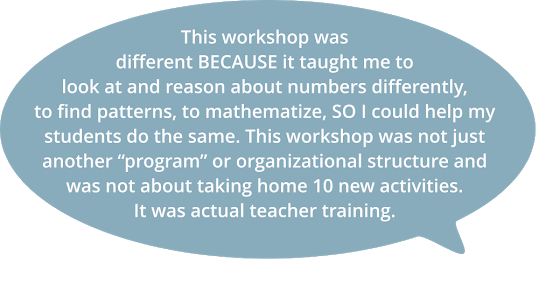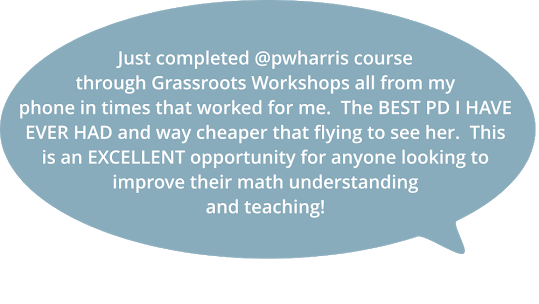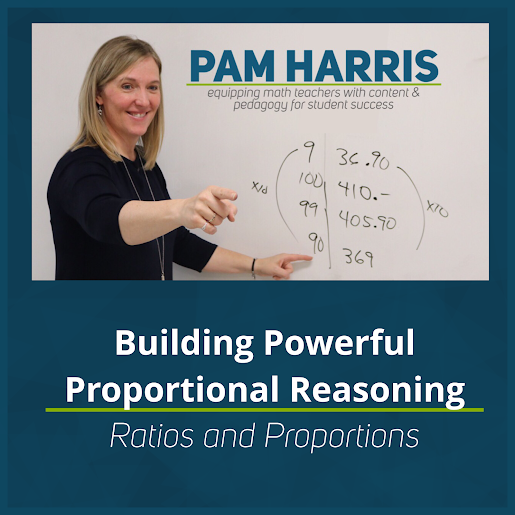Middle school teachers, are you frustrated . . .
✔ by unrealistic expectations of teaching ratio and proportion to students who don't know their facts?
✔ by new methods and models you're expected to teach?
✔ that your students should be more successful since you are putting in so much effort?
What if you could teach so students think and reason mathematically?
Ready to conquer solving proportions?
We got you.
This workshop is everything you need. 6 modules, 6 weeks, a powerful transformation to make a REAL impact for your students. $347
Leaders - Looking for packages to support groups?
"If you have even one student in your class that struggles with math, then take a Pam Harris workshop."
-Christopher Peterson, West High School, CA
Have you ever felt frustrated that you have to teach content you were never taught to unprepared students? Do you wonder how it is that you work so hard and your students aren’t doing better?
If you’re a middle school mathematics teacher, leader, or professional learning facilitator looking to energize your teaching, then you probably already know that your students come to you unprepared, have gaps, sometimes not even knowing their multiplication facts.
This course will help you feel empowered, enlightened, and energized.
By using the Development of Mathematical Reasoning to guide your decisions, you choose tasks that are open enough so that all your students can access and each are challenged.
Registration closes February 6, 2026
00
DAYS
00
HOURS
00
MINUTES
00
SECONDS
Workshop starts February 10, 2026
As a Participant
You will identify how the teaching of proportional reasoning has changed and why it matters so that you can base decisions on helping your students develop.
You will learn how to begin, by providing support for students who don't know their multiplication facts so that you can help students develop multiplicative reasoning and proportional reasoning at the same time.
You will extend the learning to more complicated contexts so that you can strengthen students' reasoning.
You will engage in problem solving so that you can parse out the thinking needed to solve proportional reasoning problems.
You will learn actionable strategies while engaging in the instructional routine called Problem Strings so that you can develop students' proportional reasoning and build specific mathematical strategies.
You will study three lesson types so that you can to learn to introduce, construct, and solidify proportional reasoning.
You will analyze expert teacher moves so that you can energize your classroom and keep students engaged in sense making.
You will get clear about the nuances of ratio, rational number, fraction, and rate so that you can help students use them appropriately.
From Participants of the Live Workshop

Online Participants Think It's Great Too!

Your questioning techniques and encouragement put these students so at ease that they were willing to take risks and explain their thinking. We teachers in our classroom rarely have a chance to tweak our teaching by observing others; this unique workshop has been a golden opportunity to soak in techniques from a master teacher. So much better in many ways than a book or a short session at a math conference.
Anne Hambrick

I have always wanted to help students understand the "why" of the math they are learning. I've struggled being able to do that consistently, and well, through all of the content. I also definitely thought knowing the algorithm was more important than I do now. Looking back, it's hard to see how those two mindsets fit together.
I had a lot of a-ha moments throughout this workshop. It's hard to pick one, but I'm going to say ratio tables. I never realized how versatile they can be. I almost always go straight to a ratio table now when approaching problems. It just makes so much sense!
Teaching students to think and reason through a problem, while still covering the standards, is so doable! We often ask students if their solution is reasonable, and tell them how to "know" if it is reasonable, yet teaching how to determine reasonableness was neglected. That will soon be a thing of the past in my classrooms.
Mindee McBryde

Sharing the idea of how to reason proportionally is huge for me. I have made connections to percentages that I never saw before. It has opened my eyes to conceptual understanding that I didn’t have before.
Shawn Hershey
I loved that Pam responded directly to my posts. It felt more personal and that she was connecting with me and cared about my questions and thoughts.
Amy Kimball

I had so many times during this workshop in which I thought "I wish I were still teaching" and "I wish all of our teachers in our district could go through these courses". I used ratio tables in my classroom when I taught to help with proportional thinking, but unfortunately when I first started using them I used it as another algorithm in a way that I showed the students "how" to do it rather than letting the construct them in their own way. The more I learned about them the more I let students do the thinking, but I always get excited when working through problems like we did in this course as I look for different ways to see the problem and reason through the math.
It was really great to see the student videos. Our teachers always ask what does this look like with students or "my" students can't do that. It was evident that the students in the video were at different levels and you engaged all of them. I loved the equity map. We do a lot of equity work in our district and this will definitely be something I share with teachers.
Danielle Perico
Are you ready?

If you have heard enough and you are ready to join me in my online workshop, then click below to register now!
The workshop costs $347, less than the registration cost for many large conferences and way more convenient.
How Does The Workshop Compare?

Learn more about how to earn credits through University of Massachusetts Global.




